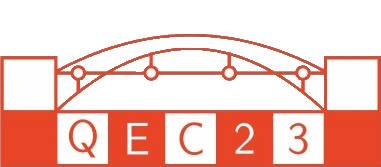
QEC25 marks the 7th International Conference on Quantum Error Correction, a prestigious biennial event that has been a cornerstone of the quantum research community since its inception in 2007. Previous editions have been hosted in leading international cities, including Los Angeles, California; Zurich, Switzerland; Washington, District of Columbia; London, UK; and Sydney, Australia. For the 2025 edition, the conference returns to the United States, proudly hosted by the Yale Quantum Institute.
This conference convened distinguished experts from academia and industry to explore cutting-edge research in theoretical, experimental, and technological advancements towards achieving robust quantum computation. Key topics included quantum control, error correction, fault tolerance, and their intersection with physics, computer science, and technology.
Scheduled from Monday, August 11 to Friday, August 15, 2025, QEC25 took place at the Yale Quantum Institute in New Haven
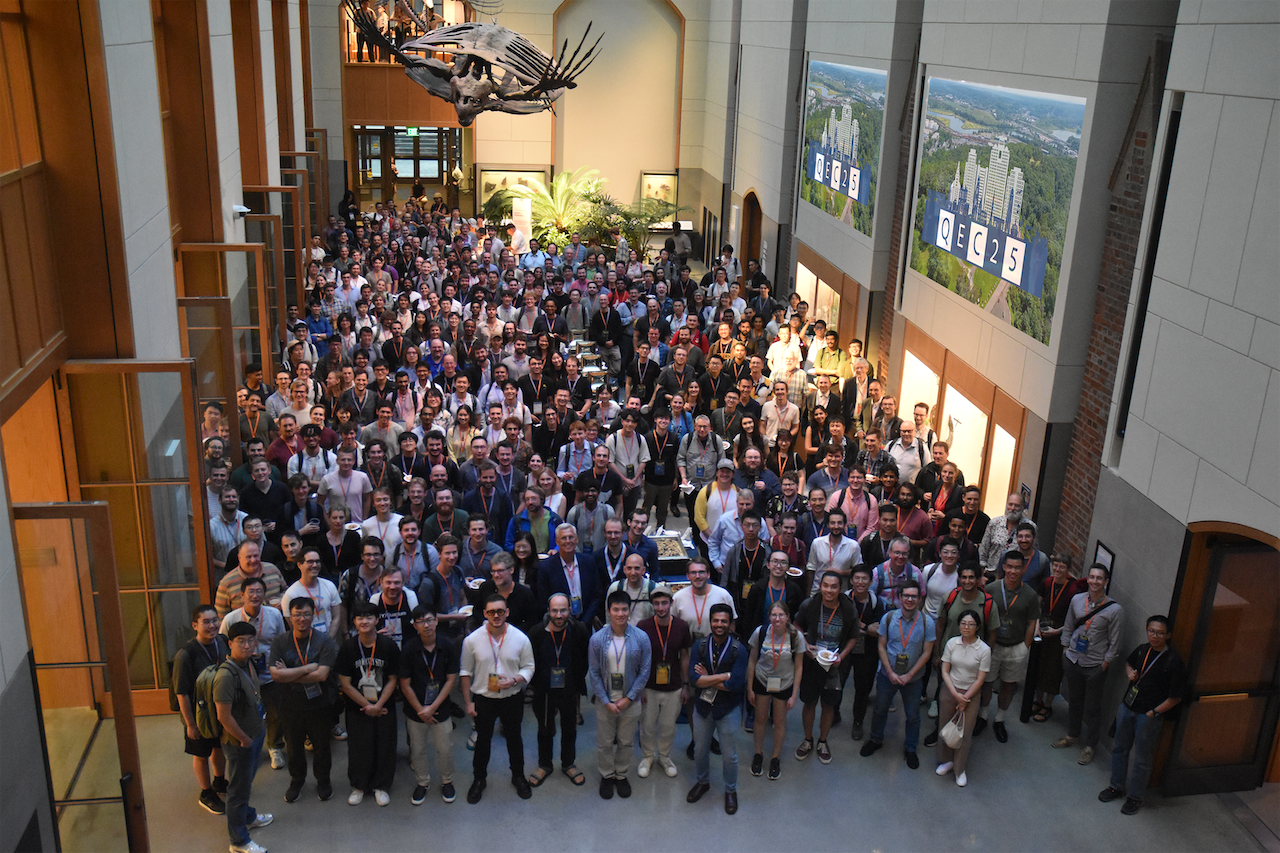
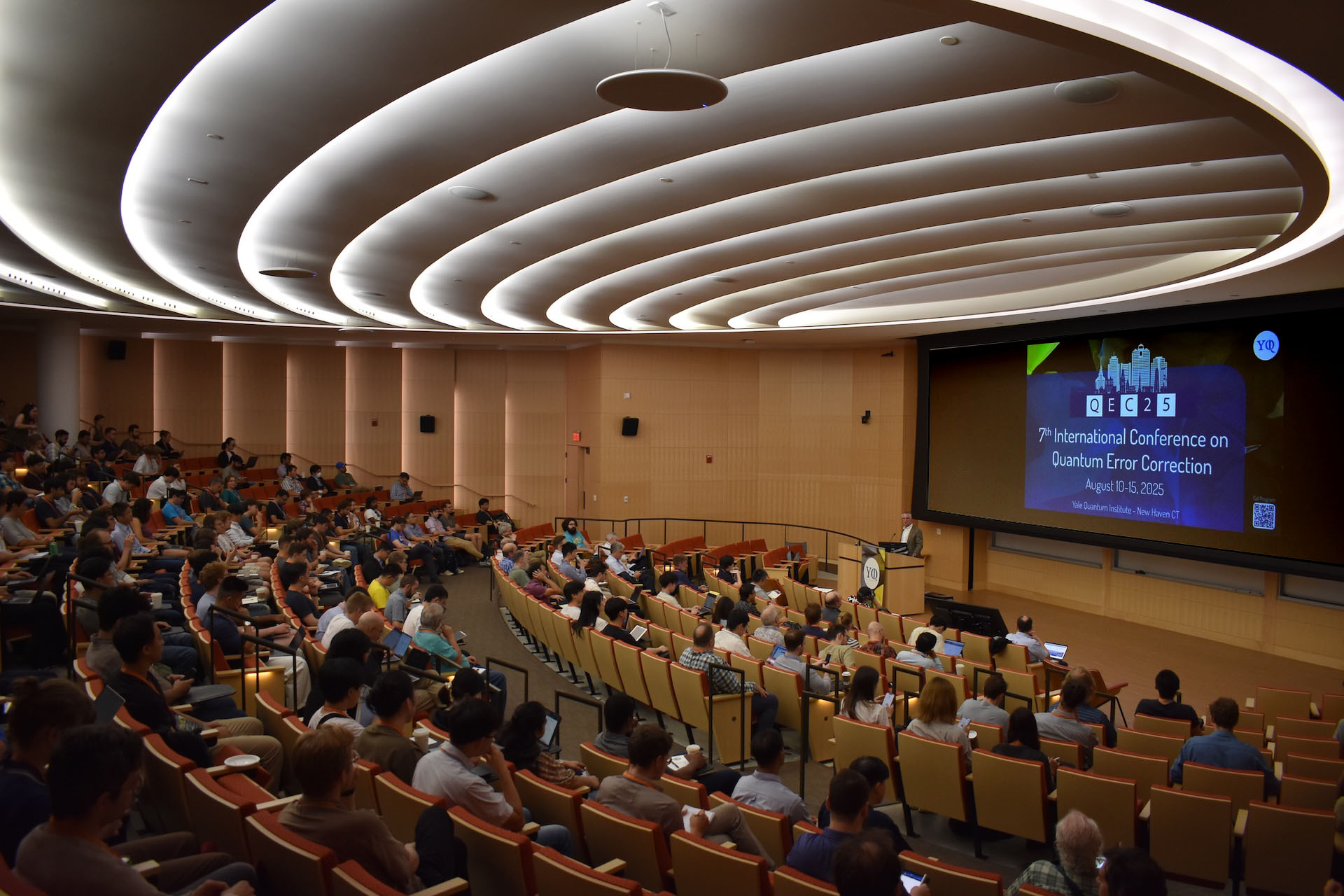
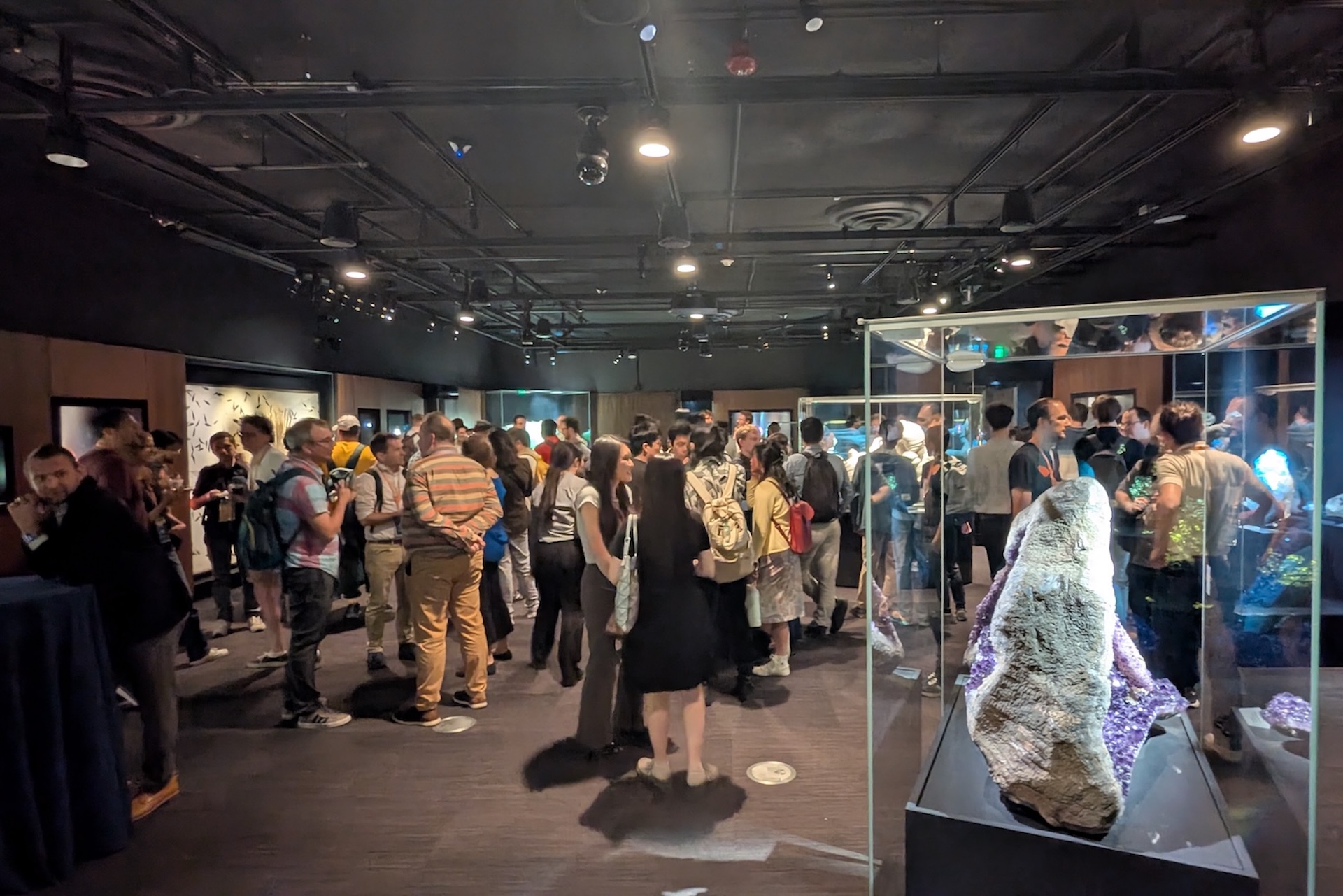
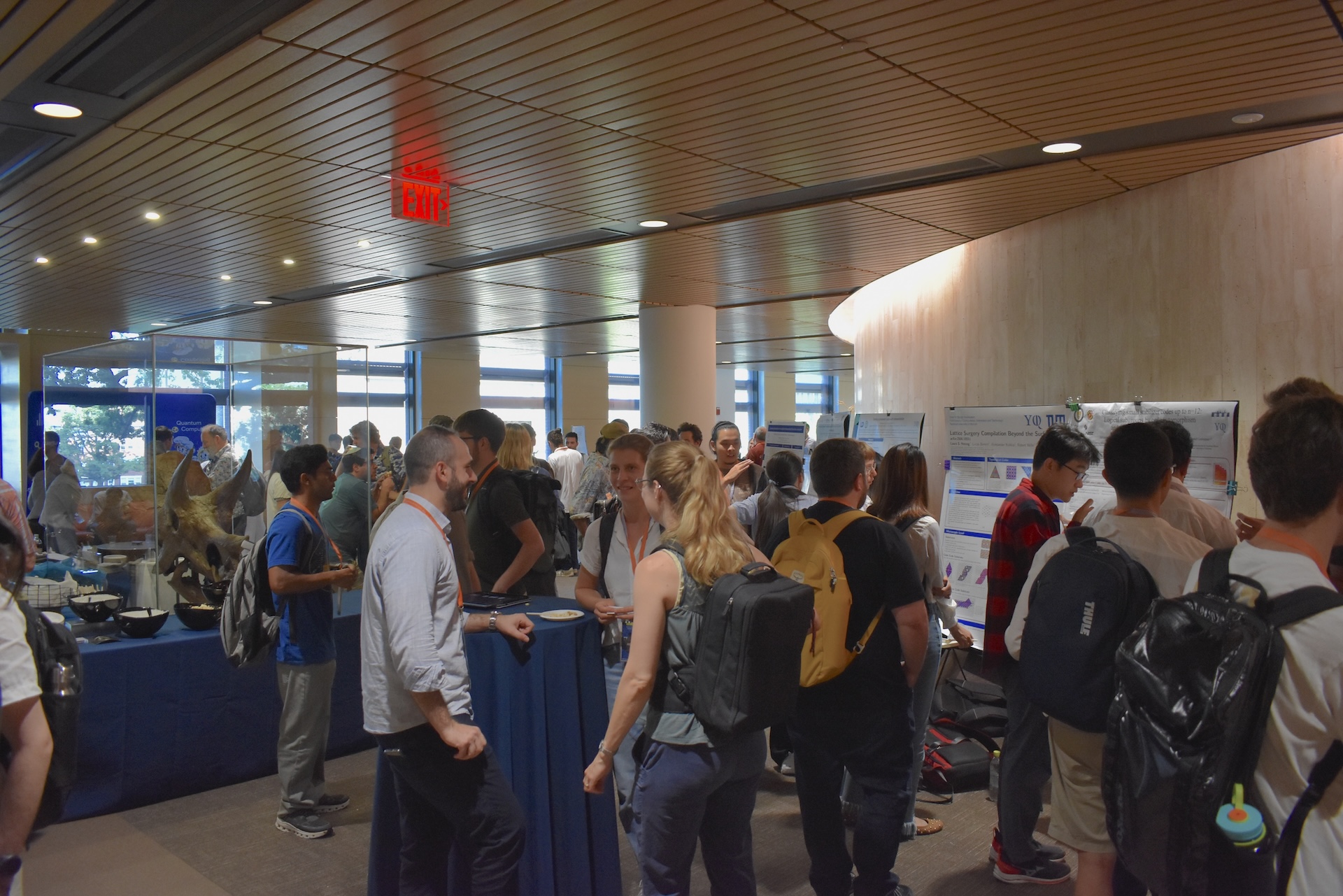
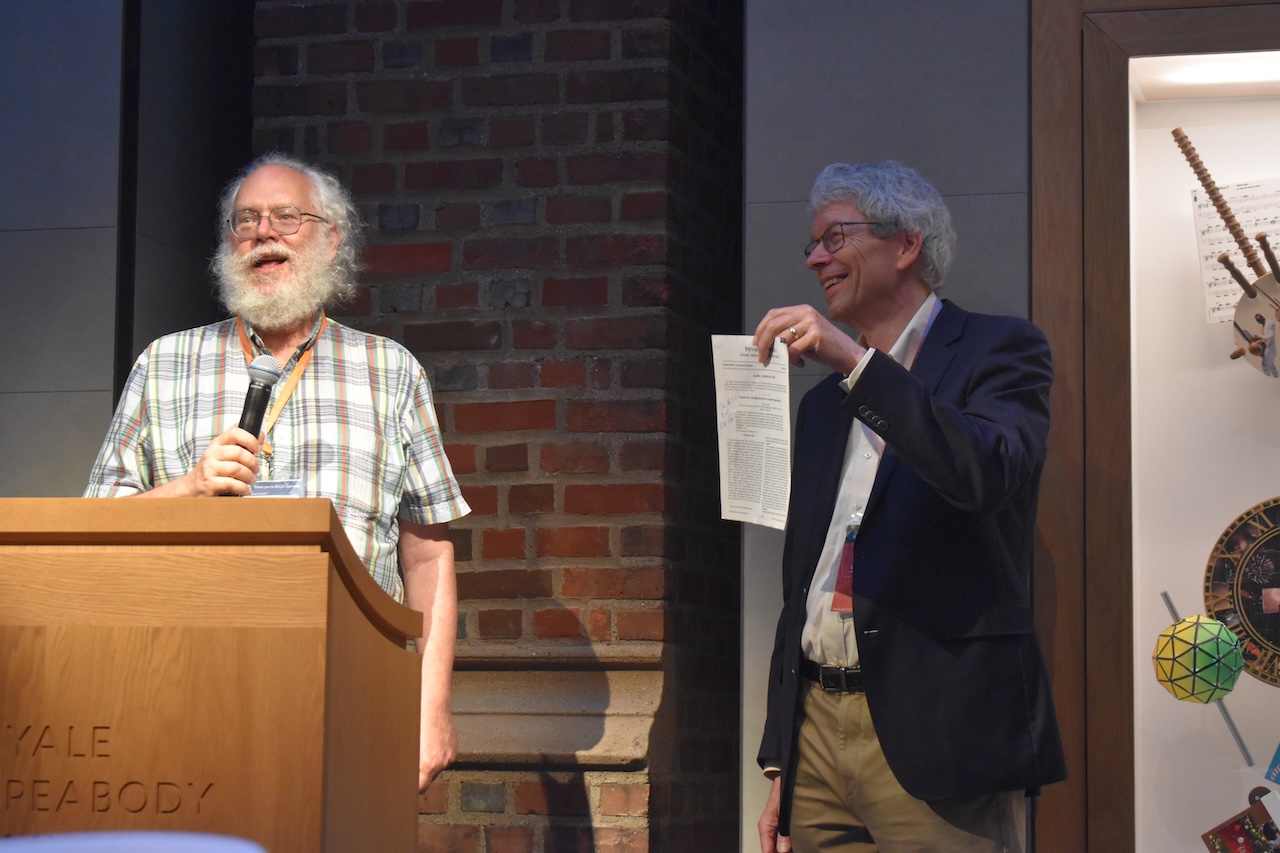
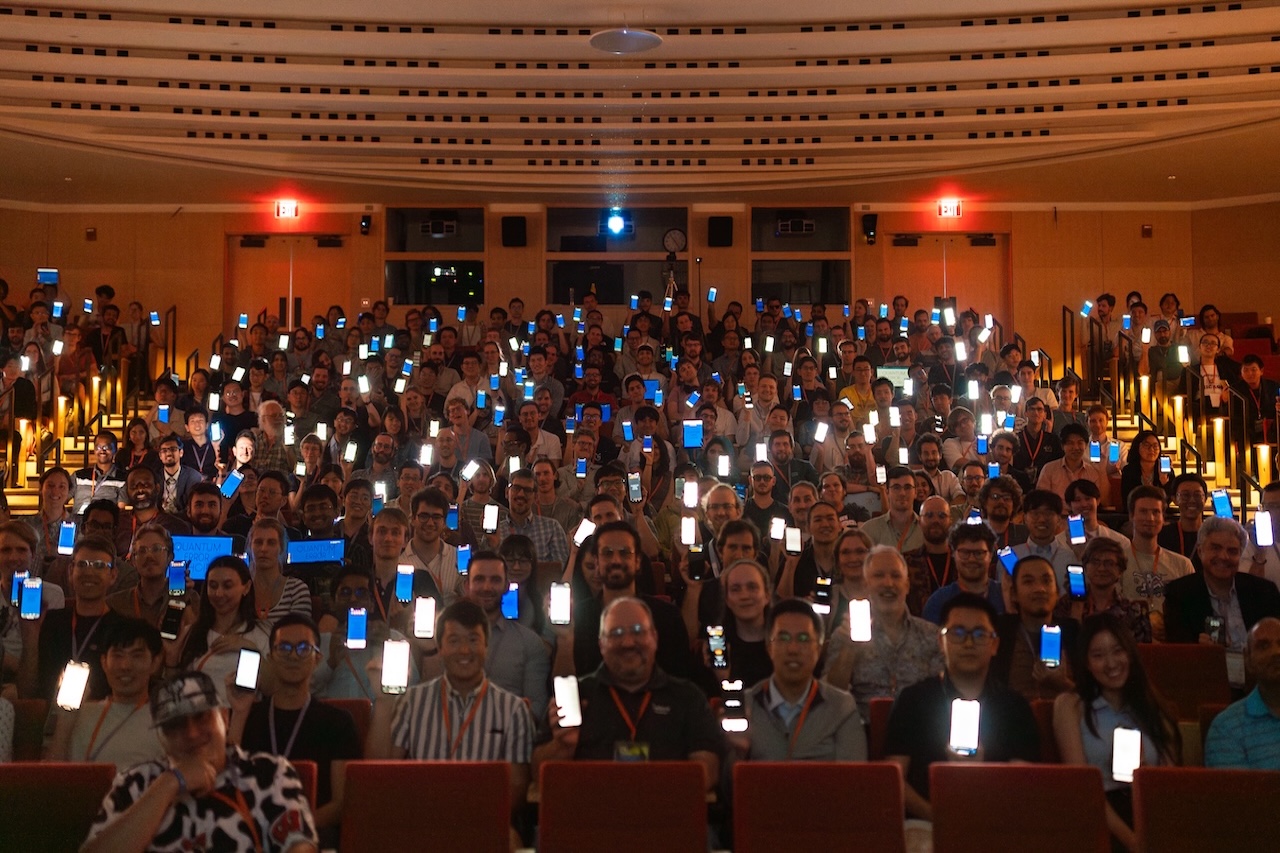
The following scientists will give invited talks during the conference, listed by alphabetical order.
The program committee received 339 submissions for contributed talks and poster presentations. After a review process, 33 submissions (including 6 merged submissions) were accepted for talks, and 135 for posters presentations (3 sessions).
Check the Schedule below for the order of the talks during QEC25.
To accomodate the large amount of poster submissions, we will have 3 posters sessions planned on Monday at 6 pm, Tuesday at 5:30 pm, and Thursday at 5:30 pm. Each poster can be on display for a day and a half to facilitate conversations beyond the poster sessions. Please follow instructions given on the poster list for set up time.
Poster sizes can be up to 36x48 in for US format, or up to A0 for ISO Standard format. We advise you to print your posters at your home institution and bring them in. If you want to print them on site, you can contact the local New Haven printers Tyco Printing, or DocuprintNow but be mindful of hours of opening and cost.
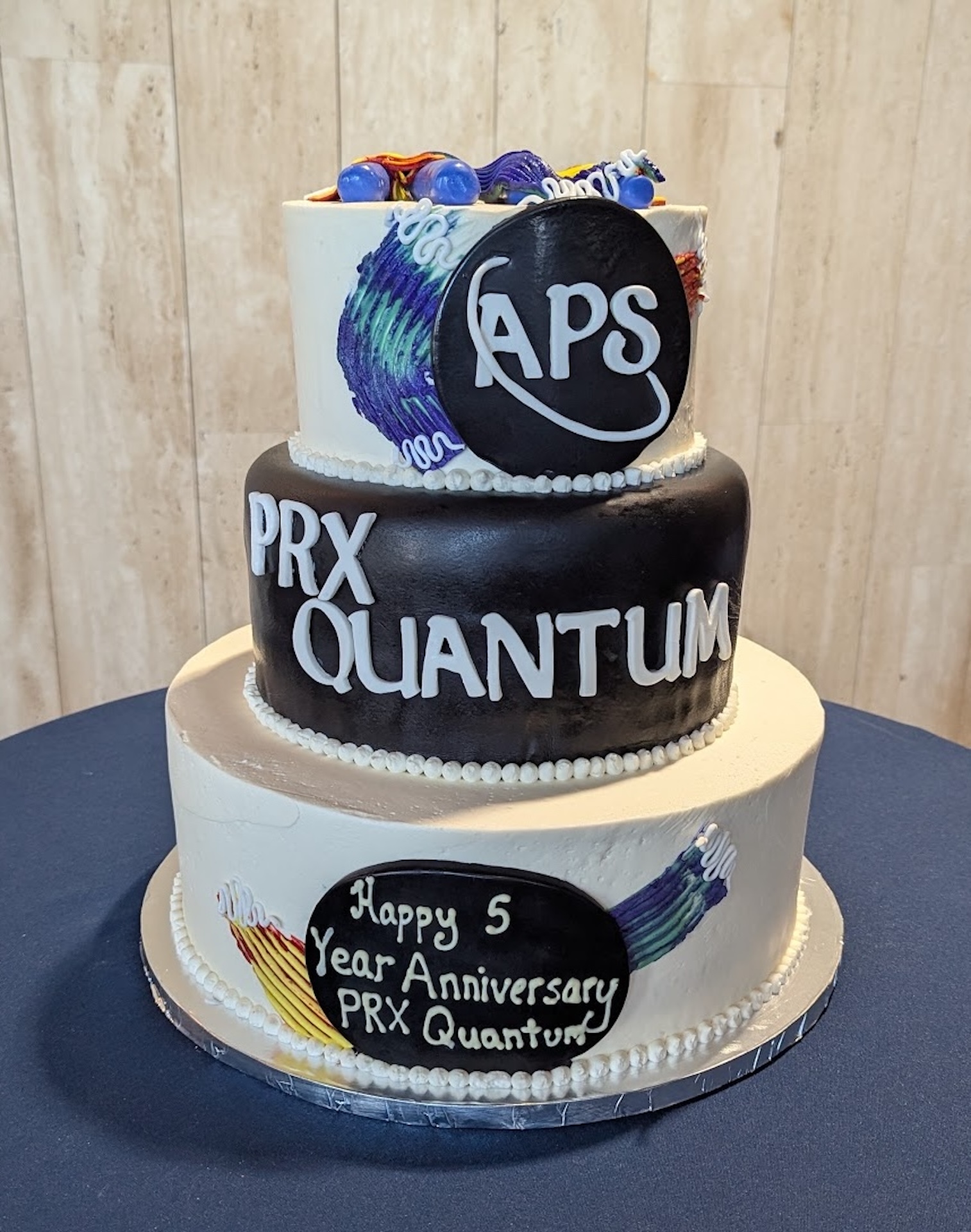
During the last poster session on Thursday, you are invited for a toast to celebrate the 5th anniversary of the PRX Quantum journal and the presentation of the PRX Quantum Award for the Best Poster (overall for the 3 poster sessions). A jury chaired by PRX Quantum Associate Editor Megan Dahlhauser will review all the posters presented at QEC25 and pick their favourite poster. The winner will get receive a goodie bag including a handcrafted wooden pen made from a fallen tree from the Yale Campus and a Yale notebook, a free APS membership, a self-warming mug, a collection of books curated by Florian Carle and Megan Dahlauser, and a few more surprises from PRX Quantum!
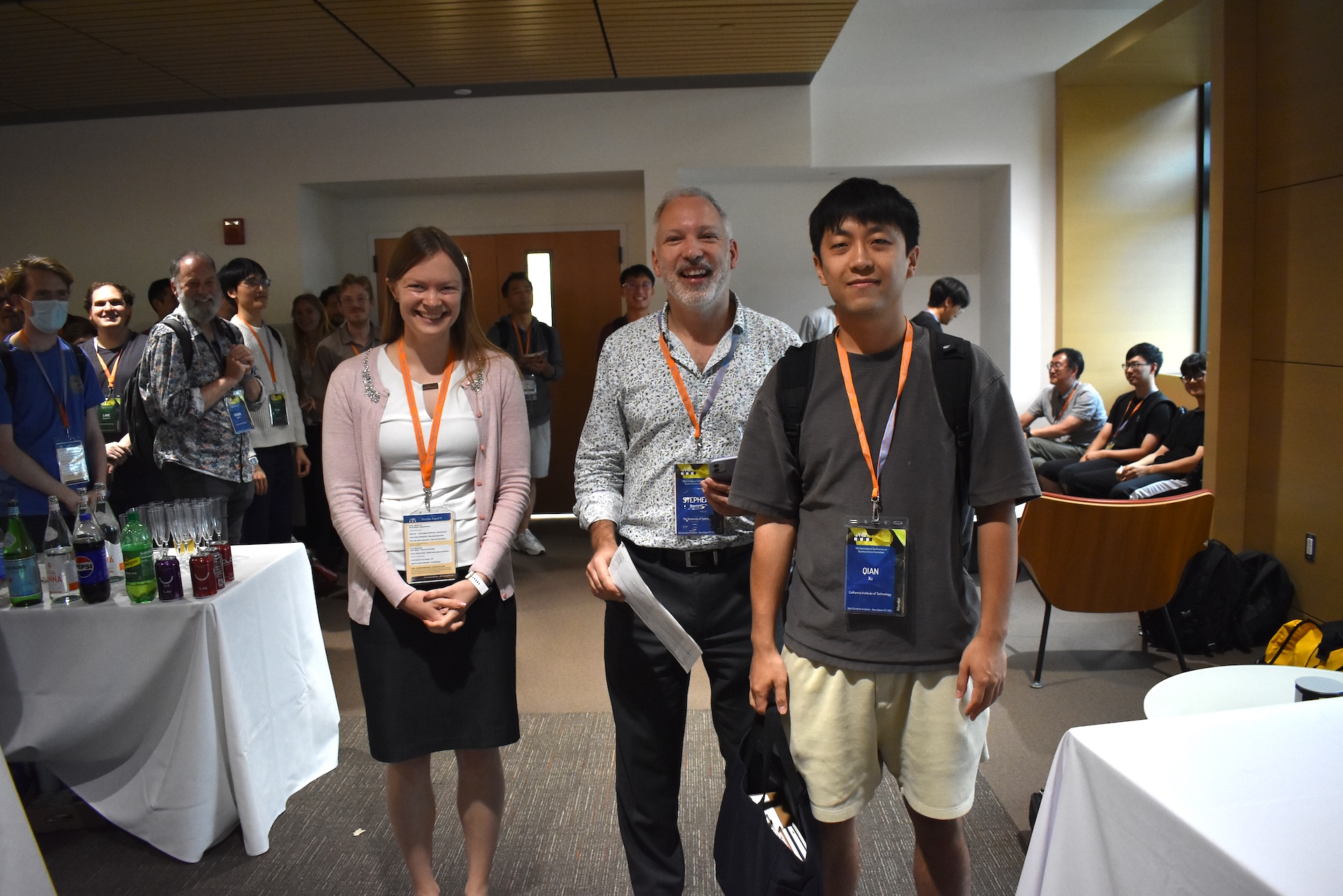
Qian Xu with Poster 54
Fast and Parallelizable Logical Computation with Homological Product Codes
Co-authors: Hengyun Zhou, Guo Zheng, Dolev Bluvstein, Pablo Bonilla, Mikhail Lukin
and Liang Jiang
Poster 11 - Yugo Takada and Hayata Yamasaki - Doubly-polylog-time-overhead fault-tolerant quantum computation by a polylog-time parallel minimum-weight perfect matching decoder
Poster 82 - Kyle Gulshen and Tali Kaufman - Quantum Tanner Color Codes on Qubits with Transversal Gates
Poster 106 - Jason Chadwick, Mariesa Teo, Joshua Viszlai, Willers Yang and Fred Chong - Erasure Minesweeper: exploring hybrid-erasure surface code architectures for efficient quantum error correction
Poster 126 - Eren Guttentag and Anthony Gómez-Fonseca - Fault-Tolerant QLDPC Syndrome Measurement via LDGM Encoding
Sponsored content by Nord Quantique
Lead the development and implementation
of advanced quantum control protocols for bosonic qubits
Lead the development and integration
of multi-cavity superconducting quantum processors
The recordings of all the talks are listed within the schedule.
This tutorial sessions is offered for students and anyone interested in the following topics, as a preparation for the conference. The tutorials are hosted in Davies Auditorium, please enter at 10 Hillhouse Avenue.
Shruti Puri (Professor of Applied Physics)
Megan Dahlhauser (Associate Editor)
Peer review: insights on how to participate and benefit
Peer review is a crucial part of science. Effective engagement with peer review, both as author and referee, is an important part of being a successful scientist. In this tutorial, you will learn more about how to be an active participant in the peer review process from editors at PRX Quantum.
The tutorial consists of informative tips and a short practice/Q&A. Participants will learn the benefits of being a referee, how to act as one, and how to successfully interact with editors and referees for the manuscripts they author.
Laura Caune (Senir Quantum Engineer) & Abe Asfaw (Head of QEC Enablement)
Why you should care about doing quantum error correction experiments?
Noah Shutty & Laleh Beni (Software Engineers)
Tesseract: A Search-Based Decoder for Quantum Error Correction
Tesseract is a high-performance decoder designed to support a broad class of quantum error correction codes and fault-tolerant protocols. It enables researchers to quickly prototype, simulate, and benchmark decoding strategies under realistic circuit-level noise, making it a practical tool for both theoretical and experimental QEC work.
Aleksander Kubica (Professor of Applied Physics)
Recent Advances in Reducing QEC Overhead
Check in at the Yale Science Building (260 Whitney Ave, New Haven, CT 06511) in the hall outside of OC Marsh & Breakfast.
Michael Crair - Yale Vice Provost for Research
Welcome Address
Opening by the QEC25 Committee
9:15 AM: KEYNOTE - Andreas Walraff - ETH Zurich
Quantum Error Correction with Superconducting Circuits: Lattice Surgery, Decoding and Leakage-Aware Gates
Watch the keynote
Quantum error correction is needed for quantum computers to fault-tolerantly execute algorithms using hundreds of logical qubits. Recent experiments have demonstrated subthreshold error rates for state preservation of single logical qubits. In addition, the realization of universal quantum computation requires the implementation of logical entangling gates. Lattice surgery is an approach for implementing such gates in planar quantum processor architectures. In this talk, I will discuss how we perform lattice surgery between two distance-three repetition-code qubits by splitting a single distance-three surface-code qubit. Using a quantum circuit fault-tolerant to bit-flip errors, we achieve an improvement in the value of the decoded ZZ logical two-qubit observable compared to a similar non-encoded circuit. By preparing the surface-code qubit in initial states parametrized by a varying polar angle, we evaluate the performance of the lattice surgery operation for non-cardinal states on the logical Bloch sphere and employ logical two-qubit tomography to reconstruct the Pauli transfer matrix of the operation. In this way, we demonstrate the functional building blocks needed for lattice surgery operations on larger-distance codes based on superconducting circuits. In addition, I will comment on our approach to experimentally informed decoding using syndrome correlations and discuss our implementation of leakage reduction units and leakage aware two-qubit gates.
Recently, usage of detecting regions facilitated the discovery of new circuits for fault-tolerantly implementing the surface code. Building on these ideas, we present LUCI, a framework for constructing fault-tolerant circuits flexible enough to construct aperiodic and anisotropic circuits, making it a clear step towards quantum error correction beyond static codes. We show that LUCI can be used to adapt surface code circuits to lattices with imperfect qubit and coupler yield, a key challenge for fault-tolerant quantum computers using solid-state architectures. These circuits preserve spacelike distance for isolated broken couplers or isolated broken measure qubits in exchange for halving timelike distance, substantially reducing the penalty for dropout compared to the state of the art and creating opportunities in device architecture design. For qubit and coupler dropout rates of 1% and a patch diameter of 15, LUCI achieves an average spacelike distance of 13.1, compared to 9.1 for the best method in the literature. For a SI1000(0.001) circuit noise model, this translates to a 36x improvement in median logical error rate per round, a factor which increases with device performance. At these dropout and error rates, LUCI requires roughly 25% fewer physical qubits to reach algorithmically relevant one-in-a-trillion logical codeblock error rates.
Snakes and Ladders: Adapting the surface code to defects (#105)One of the critical challenges solid-state quantum processors face is the presence of fabrication imperfections and two-level systems, which render certain qubits and gates either inoperable or much noisier than tolerable by quantum error correction protocols. To address this challenge, we develop a suite of novel and highly performant methods for adapting surface code patches in the presence of defective qubits and gates, which we call Snakes and Ladders. We explain how our algorithm generates and compares several strategies in order to find the optimal one for any given configuration of defective components, as well as introduce heuristics to improve runtime and minimize computing resources required by our algorithm. In addition to memory storage we also show how to apply our methods to lattice surgery protocols. Compared to prior works, our methods significantly improve the code distance of the adapted surface code patches for realistic defect rates, resulting in a logical performance similar to that of the defect-free patches.
A remarkable characteristic of quantum computing is the potential for reliable computation despite faulty qubits. This can be achieved through quantum error correction, which is typically implemented by repeatedly applying static syndrome checks, permitting correction of logical information. Recently, the development of time-dynamic approaches to error correction has uncovered new codes and new code implementations. In this work, we experimentally demonstrate three time-dynamic implementations of the surface code, each offering a unique solution to hardware design challenges and introducing flexibility in surface code realization. First, we embed the surface code on a hexagonal lattice, reducing the necessary couplings per qubit from four to three. Second, we walk a surface code, swapping the role of data and measure qubits each round, achieving error correction with built-in removal of accumulated non-computational errors. Finally, we realize the surface code using iSWAP gates instead of the traditional CNOT, extending the set of viable gates for error correction without additional overhead. We measure the error suppression factor when scaling from distance-3 to distance-5 codes of Λ35,hex = 2.15(2), Λ35,walk = 1.69(6), and Λ35,iSWAP = 1.56(2), achieving state-of-the-art error suppression for each. With detailed error budgeting, we explore their performance trade-offs and implications for hardware design. This work demonstrates that dynamic circuit approaches satisfy the demands for fault-tolerance and opens new alternative avenues for scalable hardware design.
One of the biggest obstacles to building a large scale quantum computer is the high qubit cost of protecting quantum information. For two-dimensional architectures, the surface code has long been the leading candidate quantum memory, but can require upwards of a thousand physical qubits per logical qubit to reach algorithmically-relevant logical error rates. In this work, we introduce a hierarchical memory formed from surface codes concatenated into high-density parity check codes. These yoked surface codes are arrayed in a rectangular grid, with parity checks (yokes) measured along each row, and optionally along each column, using lattice surgery. Our construction assumes no additional connectivity beyond a nearest-neighbor square qubit grid operating at a physical error rate of $10^{-3}$. At algorithmically-relevant logical error rates, yoked surface codes use as few as one-third the number of physical qubits per logical qubit as standard surface codes, enabling moderate-overhead fault-tolerant quantum memories in two dimensions.
2 PM: KEYNOTE - Margarita Davydova - California Institute of Technology
A local automaton for the 2D toric code
Watch the keynote
3 PM: Andreas Bauer - Massachusetts Institute of Technology
Universal fault tolerant quantum computation in 2D without getting tied in knots (#30)
Watch the talk
We show how to perform scalable fault-tolerant non-Clifford gates in two dimensions by introducing domain walls between the surface code and a non-Abelian topological code whose codespace is stabilized by Clifford operators. We formulate a path integral framework which provides both a macroscopic picture for different logical gates as well as a way to derive the associated microscopic circuits. We also show an equivalence between our approach and prior proposals where a 2D array of qubits reproduces the action of a transversal gate in a 3D stabilizer code over time, thus, establishing a new connection between 3D codes and 2D non-Abelian topological phases. We prove a threshold theorem for our protocols under local stochastic circuit noise using a just-in-time decoder to correct the non-Abelian code.
Recent advances in quantum error-correction (QEC), such as the discovery of Floquet codes, have shown that it is often beneficial to understand fault-tolerance as a dynamical process---a circuit with redundant measurements that help correct errors---rather than as a static code coming along a syndrome extraction circuit. Spacetime codes have emerged as a natural framework to understand error-correction at the level of circuit while leveraging the traditional QEC toolbox. This work introduces a framework based on chain complexes and chain maps to model spacetime codes and transformations between them. We show that stabilizer codes, quantum circuits, and decoding problems can all be described using chain complexes, and that the equivalence of two spacetime codes can be characterized by specific chain maps, the fault-tolerant maps, that preserve the number of encoded qubits, fault distance, and minimum-weight decoding problem. As an application of this framework, we extend the foliated cluster state construction from stabilizer codes to any spacetime code, showing that any Clifford circuit can be transformed into a measurement-based protocol with the same fault-tolerant properties. To this protocol, we associate a chain complex which encodes the underlying decoding problem, generalizing previous cluster state complex constructions. Notably, our complex can be non-bipartite and incorporate Y measurement. This method enables the construction of cluster states from non-CSS, subsystem, and Floquet codes, as well as from logical operations on a given code.
We introduce a model for a stacked quantum memory made with multi-qubit cells, inspired by multi-level flash cells in classical solid-state drive, and we design quantum error correction codes for this model by generalizing rank-metric codes to the quantum setting. Rank-metric codes are used to correct faulty links in classical communication networks. We propose a quantum generalization of Gabidulin codes, which is one of the most popular family of rank-metric codes, and we design a protocol to correct faults in Clifford circuits applied to a stacked quantum memory based on these codes. We envision potential applications to the optimization of stabilizer states and magic states factories, and to variational quantum algorithms. Further work is needed to make this protocol practical. It requires a hardware platform capable of hosting multi-qubit cells with low crosstalk between cells, a fault-tolerant syndrome extraction circuit for rank-metric codes and an associated efficient decoder.
Proving fault-tolerant threshold theorems is a burdensome endeavor with many moving parts that come together in relatively formulaic but lengthy ways. However, it is difficult and rare to combine elements from multiple papers into a single formal threshold proof. We introduce a new framework that we call composable fault-tolerance that allows for simple proofs of fault-tolerant computation that can borrow from a "library" of standard gadgets used before (e.g. state injection, distillation, error-correction gadgets, etc). This framework heavily relies on the weight enumerator formalism previously introduced in a recent fault-tolerance threshold proof. We expect that new fault-tolerance proofs may focus on the novel pieces while leaving the standard parts to the composable fault-tolerance framework with the formal proof following the "napkin math" exactly. To unify standard results in the literature, we give pedagogically relevant applications of our formalism to some standard fault-tolerant gadget constructions.
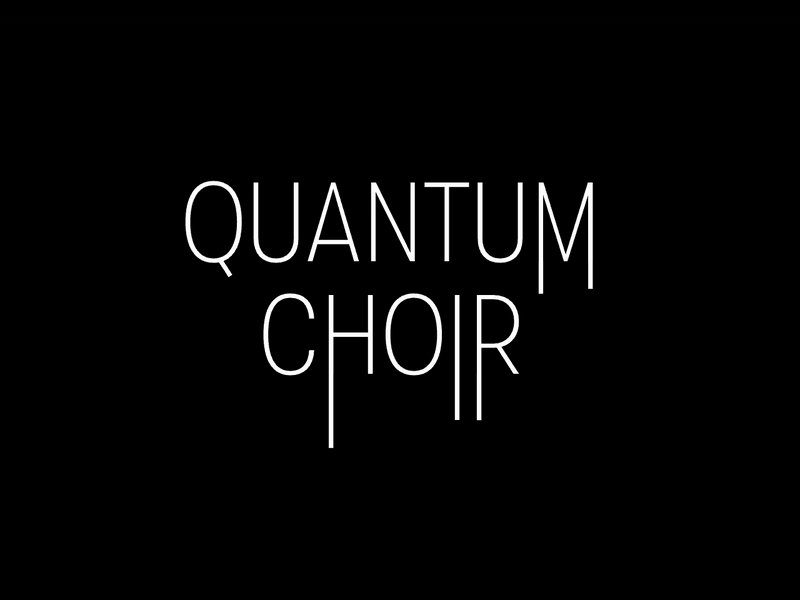
YQI Artist-in-Residence Stewart Smith, Yale CS graduate student Yue Wu, and YQI Managing Director Florian Carle invite you to experience an in-person real-time quantum error correction in the auditorium!
Armed of your own device (phone, tablet...), QEC25 attendees will create a network of ancilla qubits, entangling with the invisible data qubits around to reveal errors that arise in the system.
This will also be the opportunity to take a QEC25 group photo.
Presented by APS PRX Quantum.
Presenters can set up their posters on Monday starting at 8 am, and can leave them on display until Tuesday at noon to ensure enough time for conversations. See the full list of poster here.
9 AM: KEYNOTE - Michael Gullans - University of Maryland
Exploring architectures and algorithms for early fault-tolerant quantum computers
Watch the keynote
The threshold theorem in quantum computing guarantees that it is possible to perform reliable computation with a provable advantage over classical computers. Experimental progress in quantum devices has advanced this concept from a theoretical curiosity to one of increasing technological relevance. These developments inspire new questions at the intersection of many-body physics and computer science about how to characterize, describe, and exploit dynamical phases of quantum matter that arise in fault-tolerant quantum computers. In this talk, I will describe several examples in this direction from my research, illustrated also by experiments on current quantum devices.
10 AM: Coffee breakOrdered phases of matter have close connections to computation. Two prominent examples are spin glass order, with wide-ranging applications in machine learning and optimization, and topological order, closely related to quantum error correction. Here, we introduce the concept of topological quantum spin glass (TQSG) order which marries these two notions, exhibiting both the complex energy landscapes of spin glasses, and the quantum memory and long-range entanglement characteristic of topologically ordered systems. Using techniques from coding theory and a quantum generalization of Gibbs state decompositions, we show that TQSG order is the low-temperature phase of various quantum LDPC codes on expander graphs, including hypergraph and balanced product codes. Our work introduces a topological analog of spin glasses that preserves quantum information, opening new avenues for both statistical mechanics and quantum computer science.
If experimental progress in building fault-tolerant quantum devices continues at its current pace, certifying the correctness of logical computations run on these machines using solely classical methods will soon become infeasible. It will not be possible to arbitrarily suppress noise in early fault-tolerant quantum hardware due to space-time constraints. Therefore, the ability to quickly and accurately assess the performance of a computation run on such devices will become crucial. In this work we introduce the logical accreditation protocol to efficiently evaluate the correctness of computations run on early fault-tolerant quantum devices. This method is sensitive to noise affecting the entire logical computation, and to far more general forms of noise than usually considered in the analysis of quantum error correction (QEC). Numerical simulations of surface code performance indicate this approach can be used to certify quantum advantage experiments involving encoded logical qubits, identify when encoded logical computations start to outperform computation with physical qubits, and assess whether logical circuit error rates are sufficiently low that error mitigation might be efficiently applied to improve the output. A novel compilation scheme is used to convert general logical circuit noise into stochastic logical Pauli noise. One aspect of this is the twirling of non-transversal logical gates beyond the $T$ gate - an open question originally posed by Piveteau et al.
Throughout its history, the theory of quantum error correction has heavily benefited from translating classical concepts into the quantum setting. In particular, classical notions of weight enumerators, which relate to the performance of an error-correcting code, and MacWilliams' identity, which helps to compute enumerators, have been generalized to the quantum case. In this work, we establish a distinct relationship between the theoretical machinery of quantum weight enumerators and a seemingly unrelated physics experiment: we prove that Rains' quantum shadow enumerators - a powerful mathematical tool - arise as probabilities of observing fixed numbers of triplets in a Bell sampling experiment. This insight allows us to develop here a rigorous framework for the direct measurement of quantum weight enumerators, thus enabling experimental and theoretical studies of the entanglement structure of any quantum error-correcting code or state under investigation. On top of that, we derive concrete sample complexity bounds and physically-motivated robustness guarantees against unavoidable experimental imperfections. Finally, we experimentally demonstrate the possibility of directly measuring weight enumerators on a trapped-ion quantum computer. Our experimental findings are in good agreement with theoretical predictions and illuminate how entanglement theory and quantum error correction can cross-fertilize each other once Bell sampling experiments are combined with the theoretical machinery of quantum weight enumerators.
2 PM: KEYNOTE - James Teoh - Quantum Circuits
Quantum error correction with dual-rail cavity qubits
Watch the keynote
3 PM: Kevin Chou - Quantum Circuits
Demonstrating error-corrected erasure qubits with superconducting dual-rail cavities (#188)
Watch the talk
Erasure qubits have been proposed as a strategy to dramatically reduce requirements for quantum error correction. These qubits are designed such that dominant errors can be detected when and where they occur without requiring ancilla qubits. When incorporated in a higher-level error correcting code, erasure qubits can help achieve higher error thresholds and lead to a larger effective code distance compared to Pauli errors. While working towards this goal of larger scale systems of erasure qubits, we can already test out error correction experiments using smaller systems of erasure qubits, for example, it is possible to correct for one erasure error using four data qubits. We utilize superconducting cavities in a dual-rail architecture to realize a multi-qubit erasure qubit processor. For dual-rail cavity qubits, where we encode our qubit in the single-photon manifold of two cavity modes, the dominant error channel is single photon loss to the vacuum state which can be efficiently detected. Residual dephasing errors are an order of magnitude smaller and bit-flip errors in this system occur at the parts per million level. We show this hierarchy of errors can be largely preserved for all operations, including state preparation and measurement, single-qubit gates, and two-qubit gates. Furthermore, we detail some special properties of our two-qubit gate whereby one of the two qubits suffers the majority of the (small) errors and discuss benefits for error correction. We combine all of these operations in a multi-qubit system to demonstrate error correction experiments on a small four-qubit code using the [[4,1,2]] encoding. We show logical state preparation and single qubit gates that can correct a single erasure and detect a single Pauli error. To our knowledge, this is the first demonstration controlling multiple erasure qubits in a superconducting processor.
One of the roadblocks towards the implementation of a fault-tolerant superconducting quantum processor is impacts of ionizing radiation with the qubit substrate. Such impacts temporarily elevate the density of quasiparticles (QPs) across the device, leading to correlated qubit error bursts. The most damaging errors – T1 errors – stem from QP tunneling across the qubit Josephson junctions (JJs). Recently, we demonstrated that this type of error can be strongly suppressed by engineering the profile of superconducting gap at the JJs in a way that prevents QP tunneling. In this work, we identify a new type of correlated error that persists in the presence of gap engineering. We observe that impacts shift the frequencies of the affected qubits, and thus lead to correlated phase errors. The frequency shifts are systematically negative, reach values up to 3 MHz, and last for ~1 ms. We provide evidence that the shifts originate from the QP-qubit interactions in the JJ region. Further, we experimentally demonstrate these correlated phase errors are detrimental to the performance of quantum error correction protocols.
Efficient and high-performance quantum error correction is essential for achieving fault-tolerant quantum computing. Low-depth random circuits offer a promising approach to identifying effective and practical encoding strategies. In this work, we construct quantum error-correcting codes based on one-dimensional, logarithmic-depth random Clifford encoding circuits with a two-layer circuit structure. We demonstrate that these random codes typically exhibit good approximate quantum error correction capability by proving that their encoding rate achieves the hashing bound for Pauli noise and the channel capacity for erasure errors. Moreover, we show that the error correction inaccuracy decays exponentially with circuit depth, resulting in negligible errors for these logarithmic-depth circuits. We also establish that these codes are optimal, proving that logarithmic depth is necessary to maintain a constant encoding rate and high error correction performance. To prove our results, we propose new decoupling theorems for one-dimensional, low-depth circuits. These results also imply the strong decoupling and rapid thermalization within low-depth random circuits and have potential applications in quantum information science.
Presented by APS PRX Quantum.
Presenters can set up their posters on Tuesday starting at 12 pm, and can leave them on display until Wednesday 6 pm to ensure enough time for conversations. See the full list of poster here.
9 AM: KEYNOTE - Andrew Cross - IBM
qLDPC codes and architectures
Watch the keynote
10 AM: Coffee break
10:30 AM: Mackenzie Shaw - TU Delft
Lowering Connectivity Requirements For Bivariate Bicycle Codes Using Morphing Circuits, and More (#56)
Watch the talk
Bravyi et al. found examples of Bivariate Bicycle (BB) codes with similar logical performance to the surface code but with an improved encoding rate. In this work, we generalize a novel parity-check circuit design principle called morphing circuits and apply it to BB codes. We define a new family of BB codes whose parity check circuits require a qubit connectivity of degree five instead of six while maintaining their numerical performance. Logical input/output to an ancillary surface code is also possible in a biplanar layout. Finally, we develop a general framework for designing morphing circuits and present a sufficient condition for its applicability to two-block group algebra codes.
Quantum code surgery is a flexible and low overhead technique for performing logical measurements on quantum error-correcting codes, which generalises lattice surgery. In this work, we present a code surgery scheme, applicable to any Calderbank-Shor-Steane quantum low-density parity check (LDPC) code, that fault-tolerantly measures many logical Pauli operators in parallel. For a collection of logically disjoint Pauli product measurements supported on t logical qubits, our scheme uses O(tω(log t + log^3 ω)) ancilla qubits, where ω ≥ d is the maximum weight of the single logical Pauli representatives involved in the measurements, and d is the code distance. This is all done in time O(d) independent of t. Our proposed scheme preserves both the LDPC property and the fault-distance of the original code, without requiring ancillary logical codeblocks which may be costly to prepare. This addresses a shortcoming of several recently introduced surgery schemes which can only be applied to measure a limited number of logical operators in parallel if they overlap on data qubits.
In pursuit of large-scale fault-tolerant quantum computation, quantum low-density parity-check (LPDC) codes have been established as promising candidates for low-overhead memory when compared to conventional approaches based on surface codes. Performing fault-tolerant logical computation on QLDPC memory, however, has been a long standing challenge in theory and in practice. In this work, we propose a new primitive, which we call an $\textit{extractor system}$, that can augment any QLDPC memory into a computational block well-suited for Pauli-based computation. In particular, any logical Pauli operator supported on the memory can be fault-tolerantly measured in one logical cycle, consisting of $O(d)$ physical syndrome measurement cycles, without rearranging qubit connectivity. We further propose a fixed-connectivity, LDPC architecture built by connecting many extractor-augmented computational (EAC) blocks with bridge systems. When combined with any user-defined source of high fidelity $\ket{T}$ states, our architecture can implement universal quantum circuits via parallel logical measurements, such that all single-block Clifford gates are compiled away. The size of an extractor on an $n$ qubit code is $\tilde{O}(n)$, where the precise overhead has immense room for practical optimizations.
2 PM: KEYNOTE - Christophe Vuillot - Alice & Bob
"Tiger codes' or 'Rotor codes' and implementations of such codes
Watch the keynote
3 PM: Benjamin Brock - Yale University
Quantum error correction of qudits beyond break-even (#18)
Watch the talk
Hilbert space dimension is a key resource for quantum information processing. A large Hilbert space is not only an essential requirement for quantum error correction, but it can also be advantageous for realizing gates and algorithms more efficiently. There has thus been considerable experimental effort in recent years to develop quantum computing platforms using qudits (d-dimensional quantum systems with d>2) as the fundamental unit of quantum information. Just as with qubits, quantum error correction of these qudits will be necessary in the long run, but to date error correction of logical qudits has not been realized experimentally. In this talk, I will present the first experimental demonstration of an error-corrected logical qutrit (d=3) and ququart (d=4), which we realize by employing the Gottesman-Kitaev-Preskill (GKP) bosonic code in a superconducting circuit platform. Using a reinforcement learning agent, we optimize the GKP qutrit (ququart) as a ternary (quaternary) quantum memory and achieve beyond break-even error correction with a gain of 1.82 +/- 0.03 (1.87 +/- 0.03). This work represents a new way of leveraging the large Hilbert space of a harmonic oscillator for hardware-efficient quantum error correction.
The quantum error-correcting code in the continuous-variable (CV) system attracts much attention due to its flexibility and high resistance against specific noise. However, the theory of fault tolerance in CV systems is premature and lacks the general strategy to translate the noise in CV systems into the noise in logical qubits, leading to severe restrictions on the correctable noise models. In this paper, we show that the Markovian-type noise in CV systems is translated into the Markovian-type noise in the logical qubits through the Gottesman-Kitaev-Preskill code with an explicit bound on the noise strength. Combined with the established threshold theorem of the concatenated code against Markovian-type noise, we show that CV quantum computation has a fault-tolerant threshold against general Markovian-type noise, closing the existing crucial gap in CV quantum computation. We also give a new insight into the fact that careful management of the energy of the state is required to achieve fault tolerance in the CV system.
Continuous-variable cat codes are encodings into a single photonic or phononic mode that offer a promising avenue for hardware-efficient fault-tolerant quantum computation. Protecting information in a cat code requires measuring the mode's occupation number modulo two, but this can be relaxed to a linear occupation-number constraint using the alternative two-mode pair-cat encoding. We construct multimode codes with similar linear constraints using any two integer matrices satisfying the homological condition of a quantum rotor code. Just like the pair-cat code, syndrome extraction can be performed in tandem with stabilizing dissipation using current superconducting-circuit designs. The framework includes codes with various finite- or infinite-dimensional codespaces, and codes with finite or infinite Fock-state support. It encompasses two-component cat, pair-cat, dual-rail, two-mode binomial, various bosonic repetition codes, and aspects of chi-squared encodings while also yielding codes from homological products, lattices, generalized coherent states, and algebraic varieties. Among our examples are analogues of repetition codes, the Shor code, and a surface-like code that is not a concatenation of a known cat code with the qubit surface code. Codewords are coherent states projected into a Fock-state subspace defined by an integer matrix, and their overlaps are governed by Gelfand-Kapranov-Zelevinsky hypergeometric functions.
Presented by the Economic Development Administration of the City of New Haven
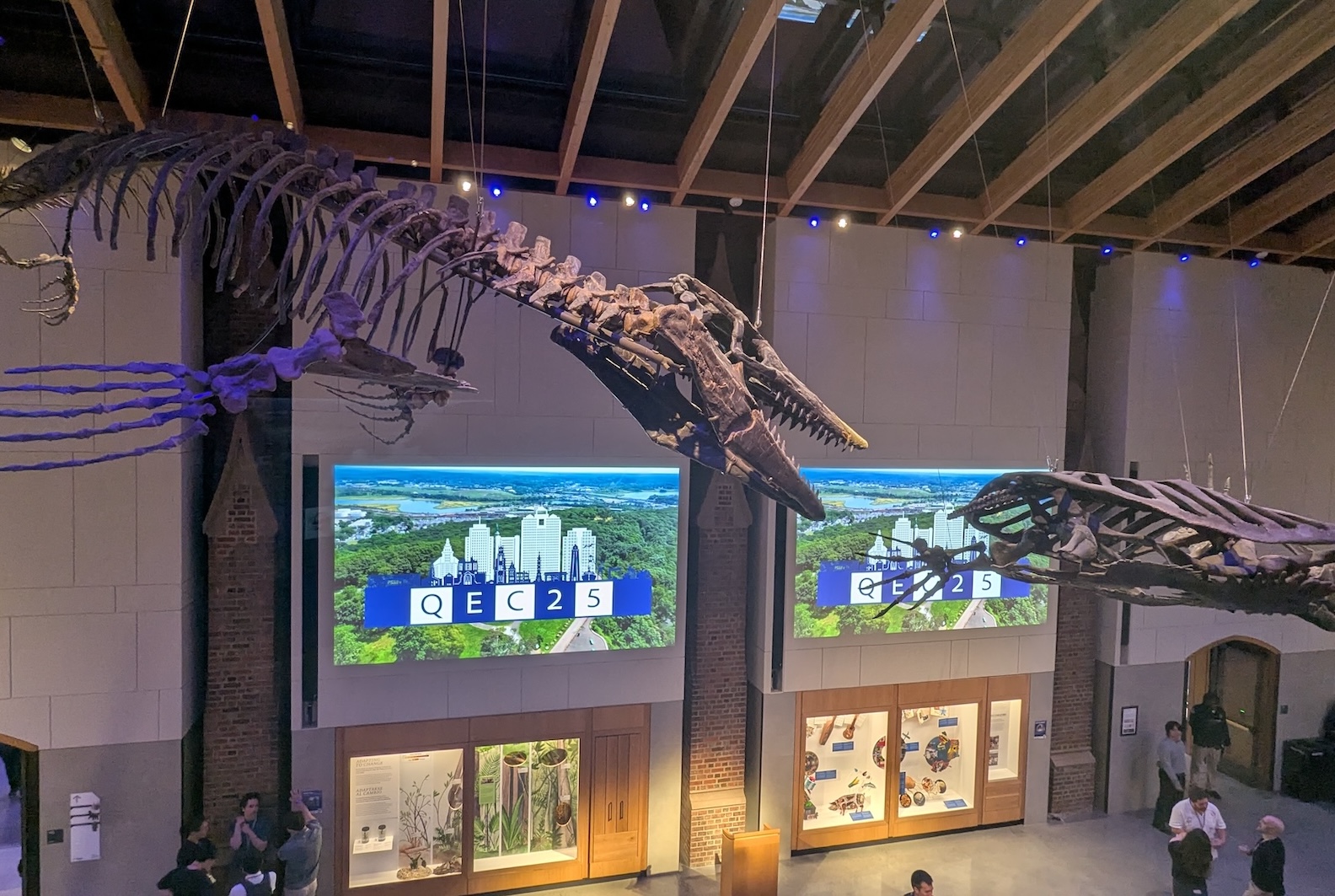 The Yale Peabody Museum is the home for over 14 million specimens and objects from 10 curated collections that tell the story of our Earth, its life, history, and cultures. Steps away from the auditorium, the entire museum will be open for QEC25 attendees. You might be particularly interested in the History of Science & Technology gallery.
The Yale Peabody Museum is the home for over 14 million specimens and objects from 10 curated collections that tell the story of our Earth, its life, history, and cultures. Steps away from the auditorium, the entire museum will be open for QEC25 attendees. You might be particularly interested in the History of Science & Technology gallery.
6:30 pm: Food and drinks provided throughout the museum (except special galleries)
7 pm: Toasts and speeches in the Burke Hall of Dinosaurs & Central Gallery
- A word from the QEC25 local organizers
- A word from Michael Piscitelli, New Haven Economic Development Administrator
- Celebration of the 30-year anniversary of the article "Scheme for Reducing Decoherence in Quantum Computer Memory" by Peter Shor.
7:30 pm: Desserts served in the David Friend Hall of Minerals
9 AM: KEYNOTE - David Hayes - Quantinuum
Quantum Error Correction in QCCD computers
Watch the Keynote
10 AM: Coffee break
10:30 AM: Ciaran Ryan-Anderson - Quantinuum
High-fidelity Teleportation of a Logical Qubit using Transversal Gates and Lattice Surgery (#149)
Watch the talk
Quantum state teleportation is commonly used in designs for large-scale quantum computers. Using Quantinuum’s H2 trapped-ion quantum processor, we demonstrate fault-tolerant state teleportation circuits for a quantum error correction code—specifically the Steane code. The circuits use up to 30 qubits at the physical level and employ real-time quantum error correction. We conducted experiments on several variations of logical teleportation circuits using both transversal gates and lattice surgery. We measured the logical process fidelity to be 0.975 ± 0.002 for the transversal teleportation implementation and 0.851 ± 0.009 for the lattice surgery teleportation implementation as well as 0.989 ± 0.002 for an implementation of Knill-style quantum error correction.
Transitioning from quantum computation on physical qubits to encoded, logical qubits can improve the error rate of operations, and will be essential to realize quantum computers’ speed advantages. Using a neutral atom quantum processor with 256 qubits, Ytterbium atoms, we demonstrate the entanglement of 24 logical qubits using the distance-two [[4,2,2]] code, simultaneously detecting errors and correcting for lost qubits. We also implement the Bernstein-Vazirani algorithm with up to 20 logical qubits encoded in the [[4,1,2]] code, showing better-than-physical error rates. We validate our approach’s fault tolerance following the method of Gottesman (2016), by demonstrating repeated loss correction for both constructed and random circuits for the [[4,2,2]] code. Finally, distance-two codes can correct qubit loss, but not other errors. Using the distance-three [[9,1,3]] Bacon-Shor code, we show repeated loss and error correction. These results begin to clear a path to achieve scientific quantum advantage with a neutral atom quantum processor.
Performing quantum algorithms for critical problems in physics and chemistry requires substantially lower error rates than the physical error rates of current quantum computers. Achieving such low logical error rates requires quantum error correction (QEC), and physical error rates below a critical threshold value. We experimentally demonstrate on a trapped-ion quantum charge- coupled device (QCCD) improvements in logical error rates ranging from 11× to 800× compared to physical baselines, including fault-tolerant quantum computation on multiple logical qubits. Our results hinge on two QEC code constructions optimized for an ion-trap processor: a 12-qubit [[12,2,4]] code inspired by Knill, and a 16-qubit [[16,4,4]] tesseract color code. These demonstrations show the critical role of quantum error correction for reducing errors, and a transition from noisy, intermediate-scale quantum (NISQ) computation to scalable, fault-tolerant quantum computation.
2 PM: KEYNOTE - Harry Zhou - Harvard University
Transversal Architectures for Neutral Atom Logical Quantum Computation
Watch the Keynote
3 PM: M. Sohaib Alam - NASA Ames Research Center
Bacon-Shor Code Revisited (#73)
Watch the talk
It is commonly believed that fundamental properties of many quantum error correcting codes are determined through the identification of a stabilizer or, more generally, gauge group, generated by the measured operators of the code, or its checks. In this talk, I will argue that this is a severely limiting view, one that ignores the order in which the checks of the code are measured, and how this order plays an equally important role in determining the code’s defining properties. Concretely, I will revisit the Bacon-Shor code. Arguably the simplest subsystem code, it is defined on a square lattice, with the set of measured operators, generating the gauge group of the code, consisting of nearest-neighbor horizontal XX and vertical ZZ checks. Viewed through the usual formalism, it hosts a single logical qubit, but lacks a threshold due to the growing weight of its stabilizers with the size of the lattice. I will show that a simple period-4 measurement schedule of the Bacon-Shor check operators introduces several dynamically generated logical degrees of freedom, such that the code can host as many logical qubits as the subsystem BPT bound allows, a dramatic departure from what the usual formalism dictates. I will further show that another, equally simple, period-4 measurement schedule of the Bacon-Shor check operators introduces constant weight detectors that cover spacetime, and provide the code with a threshold, another fundamental difference with the usual Bacon-Shor code. Unlike previous approaches, our method does not rely on code concatenation, and can be described intuitively as a coloring board game on a square lattice. Throughout the talk, I will highlight and emphasize aspects of the usual formalism to describe subsystem codes that are key to constructing the above generalizations, and to understanding the shortcomings of the usual formalism with a view to overcome them.
The development of quantum codes with good error correction parameters and useful sets of transversal gates is a problem of major interest in quantum error correction. Abundant prior works have studied transversal gates which act on all logical qubits simultaneously, for which the computational utility is limited. In this work, we study codes that support transversal gates which induce addressable logical gates, i.e., logical gates that act on logical qubits of the user's choice. We construct the first families of quantum codes that support addressable and transversal non-Clifford gates. Given any three logical qubits in one or multiple codeblocks, the logical CCZ gate may be executed on these three logical qubits via a depth-one circuit of physical CCZ gates. Our codes are asymptotically good, constructed from the transitive algebraic geometry codes due to Stichtenoth. We also present a fully explicit construction from Reed-Solomon codes, which are likely to perform better at reasonable lengths, but are only asymptotically good up to a polylog. These results naturally generalise to other gates beyond CCZ as well as to qudits. As the above constructions rely on very specific classical codes, we go on to develop a much more general framework for constructing quantum codes with addressable and transversal gates in the diagonal Clifford hierarchy. Our framework, called addressable orthogonality, encompasses the original triorthogonality framework of Bravyi and Haah, and extends this and other frameworks to study addressable gates. As an application, we construct explicit, asymptotically good codes with transversal CCZ gates that are addressable in a weaker sense than above. As another example, in an appendix we prove a condition on classical codes that allows one to construct quantum codes with transversally addressable T gates, up to Clifford corrections.
Classical locally recoverable codes, which permit highly efficient recovery from localized errors as well as global recovery from larger errors, provide some of the most useful codes for distributed data storage in practice. In this paper, we initiate the study of quantum locally recoverable codes (qLRCs). In the long term, like their classical counterparts, such qLRCs may be used for large-scale quantum data storage. Our results also have implications for quantum LDPC codes, as local recoverability is a weakening of the LDPC property. After defining quantum local recoverability, we provide an explicit construction of qLRCs based on the classical LRCs of Tamo and Barg (2014), which we show have (1) a close-to-optimal rate-distance tradeoff (i.e. near the Singleton bound), (2) an efficient decoder, and (3) permit good spatial locality in a physical implementation. The analysis for both the distance and the efficient decoding of these quantum Tamo-Barg (qTB) codes is significantly more involved than in the classical case. Nevertheless, we obtain close-to-optimal parameters by introducing a "folded" version of these qTB codes, which we analyze using a combination of algebraic techniques. We furthermore present and analyze two additional constructions using more basic techniques, namely random qLRCs, and qLRCs from AEL distance amplification. Each of these constructions has some advantages, but neither achieves all 3 properties of our folded qTB codes described above. We complement these constructions with Singleton-like bounds that show our qLRC constructions achieve close-to-optimal parameters. We also apply these results to obtain novel Singleton-like bounds for qLDPC codes. We then show that even the weakest form of a stronger locality property called local correctability, which permits more robust local recovery and is achieved by certain classical codes, is impossible quantumly.
Presented by APS PRX Quantum
Presenters can set up their posters on Thursday starting at 8 am, and can leave them on display until Friday at 12 pm to ensure enough time for conversations. See the full list of poster here.
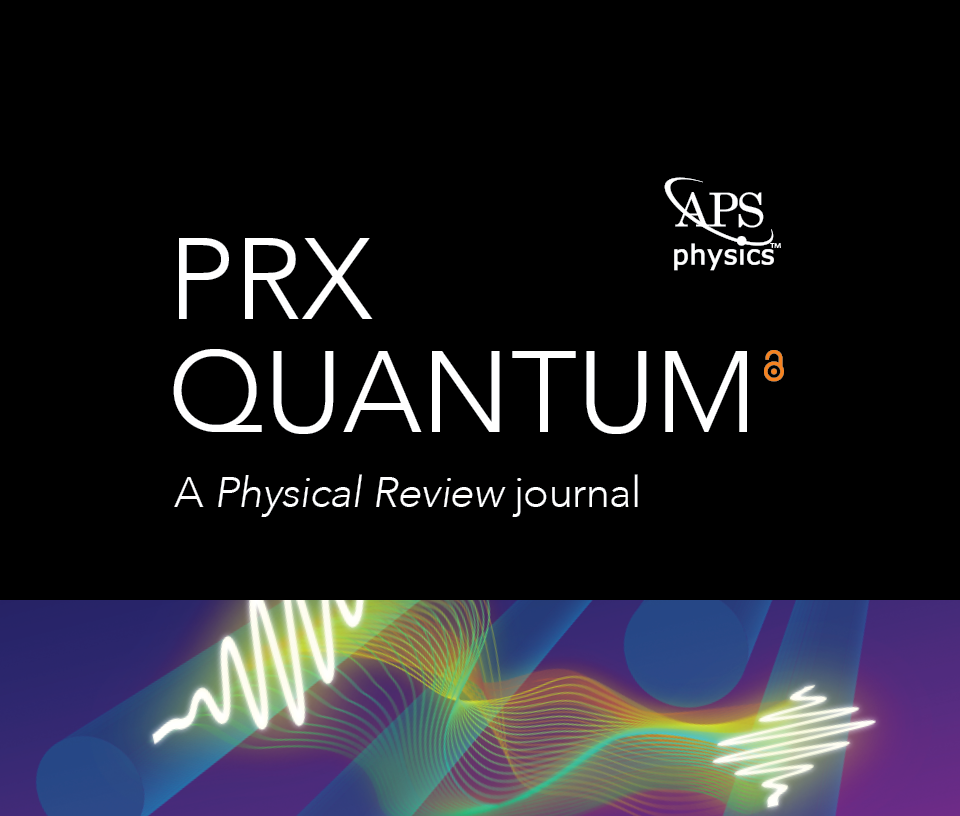
All attendees are invited to a special toast to celebrate for the 5th anniversary of the PRX Quantum journal, and presentation of the QEC25 Award for the Best Poster (overall for the 3 poster sessions) presented by APS PRX Quantum.
9 AM: KEYNOTE - Noah Shutty - Google Quantum AI
Codes and Decoders for Near-Term Quantum Computers
Watch the keynote
10 AM: Coffee break
10:30 AM: Alec Eickbusch - Google Quantum AI
Quantum error correction below the surface code threshold (#109)
Watch the talk
Quantum error correction provides a path to reach practical quantum computing by combining multiple physical qubits into a logical qubit, where the logical error rate is suppressed exponentially as more qubits are added. However, this exponential suppression only occurs if the physical error rate is below a critical threshold. In this work, we present two surface code memories operating below this threshold: a distance-7 code and a distance-5 code integrated with a real-time decoder. The logical error rate of our larger quantum memory is suppressed by a factor of Λ = 2.14 ± 0.02 when increasing the code distance by two, culminating in a 101-qubit distance-7 code with 0.143% ± 0.003% error per cycle of error correction. This logical memory is also beyond break-even, exceeding its best physical qubit's lifetime by a factor of 2.4 ± 0.3. We maintain below-threshold performance when decoding in real time, achieving an average decoder latency of 63 μs at distance-5 up to a million cycles, with a cycle time of 1.1 μs. To probe the limits of our error-correction performance, we run repetition codes up to distance-29 and find that logical performance is limited by rare correlated error events occurring approximately once every hour, or 3 × 10^9 cycles. Our results present device performance that, if scaled, could realize the operational requirements of large scale fault-tolerant quantum algorithms.
Quantum error correction is a crucial tool for mitigating hardware errors in quantum computers by encoding logical information into multiple physical qubits. However, no single error-correcting code allows for an intrinsically fault-tolerant implementation of all the gates needed for universal quantum computing. One way to tackle this problem is to switch between two suitable error-correcting codes, while preserving the encoded logical information, which in combination give access to a fault-tolerant universal gate set. In this work, we present the first experimental implementation of fault-tolerant code switching between two codes. One is the seven-qubit color code, which features fault-tolerant CNOT and H quantum gates, while the other one, the 10-qubit code, allows for a fault-tolerant T-gate implementation. Together they form a complementary universal gate set. Building on essential code switching building blocks, we construct logical circuits and prepare 12 different logical states which are not accessible natively in a fault-tolerant way within a single code. Finally, we use code switching to entangle two logical qubits employing the full universal gate set in a single logical quantum circuit. Our results experimentally open up a new route towards deterministic control over logical qubits with low auxiliary qubit overhead, not relying on the probabilistic preparation of resource states.
Recently discovered bivariate bicycle (BB) codes are quantum low-density parity check (qLDPC) codes that have very high encoding rates and distances relative to the surface code, while performing well under circuit-level noise. However, there are many other features that are useful for qLDPC codes to possess. In particular, single- shot error-correction properties can lead to reduced time overheads for decoding and logical operations such as lattice surgery, which is of particular importance, owing to the large time overheads of decoding qLDPC codes. Meanwhile, a large set of transversal gates is useful for fault-tolerant quantum computing. We introduce new codes, named the tri-variate tricycle (TT) codes, which are 3-block codes based on polynomials of three variables, generalising the BB codes. These codes possess "meta-checks" that can help diagnose measurement errors in Z checks, which leads to single-shot properties for the Z checks. We present examples of TT codes with good parameters relative to the 3D toric code. We test the performance of these codes under a phenomenological noise model, showing that they perform well under an overlapping window decoding strategy, suggesting single-shot capabilities. We also introduce syndrome measurement circuits for the TT codes. We find a large set of transversal CZ gates that implement entangling gates between code blocks. Finally, we discuss types of 3-block codes that possess non-Clifford CCZ gates.
2 PM: KEYNOTE - Priya Nadkarni - Xanadu
Fault-tolerant logical measurements via homological measurement
Watch the keynote
3 PM: [MERGED] Christopher Pattison - Caltech & Shiro Tamiya - Nanofiber Quantum Technologies
Quantum fault tolerance with constant-space and logarithmic-time overheads (#107)
Watch the talk
In a model of fault-tolerant quantum computation with quick and noiseless polyloglog-time auxiliary classical computation, we construct a fault tolerance protocol with constant-space and O˜(logN)-time overhead, where O˜(⋅) hides sub-polylog factors. Our construction utilizes constant-rate quantum locally testable codes (qLTC), new fault-tolerant gadgets on qLTCs and qLDPC codes, and a new analysis framework. In particular, 1) we develop a new simple and self-contained construction of magic state distillation for qubits using qudit quantum Reed-Solomon codes with (log 1/ε)^γ spacetime overhead, where γ→0. 2) We prove that the recent family of almost-good qLTCs of Dinur-Lin-Vidick admit parallel single-shot decoders against adversarial errors of weight scaling with the code distance. 3) We develop logical state preparation and logical gate procedures with O˜(1)-spacetime overhead on qLTCs. 4) To combine these ingredients, we introduce a new framework of fault tolerance analysis called the weight enumerator formalism. The framework permits easy formal composition of fault-tolerant gadgets, so we expect it to be of independent interest. Our work gives the lowest spacetime overhead to date, which, for the first time, matches that of classical fault tolerance up to sub-polylog factors. We conjecture this is optimal up to sub-polylog factors.
A major challenge in fault-tolerant quantum computation (FTQC) is to reduce both space overhead---the large number of physical qubits per logical qubit---and time overhead---the long physical gate sequences per logical gate. We prove that a protocol using non-vanishing-rate quantum low-density parity-check (LDPC) codes, combined with concatenated Steane codes, achieves constant space overhead and polylogarithmic time overhead, even when accounting for non-zero classical computation time. This protocol offers an improvement over existing constant-space-overhead protocols, which have polynomial time overhead using quantum LDPC codes and quasi-polylogarithmic time overhead using concatenated quantum Hamming codes. To ensure the completeness of this proof, we develop a technique called partial circuit reduction, which enables error analysis for the entire fault-tolerant circuit by examining smaller parts composed of a few gadgets. With this technique, we resolve a previously unaddressed logical gap in the existing arguments and complete the proof of the threshold theorem for the constant-space-overhead protocol with quantum LDPC codes. Our work highlights that the quantum-LDPC-code approach can realize FTQC with a negligibly small slowdown and a bounded overhead of physical qubits, similar to the code-concatenation approach, underscoring the importance of a comprehensive comparison of the future realizability of these two approaches.
Magic state distillation is a crucial yet resource-intensive process in fault-tolerant quantum computation. The protocol's overhead, defined as the number of input magic states required per output magic state with an error rate below $\epsilon$, typically grows as $\mathcal{O}(\log^\gamma(1/\epsilon))$. Achieving smaller overheads, i.e., smaller exponents $\gamma$, is highly desirable; however, all existing protocols require polylogarithmically growing overheads with some $\gamma > 0$, and identifying the smallest achievable exponent $\gamma$ for distilling magic states of qubits has remained challenging. To address this issue, we develop magic state distillation protocols for qubits with efficient, polynomial-time decoding that achieve an $\mathcal{O}(1)$ overhead, meaning the optimal exponent $\gamma = 0$; this improves over the previous best of $\gamma \approx 0.678$ due to Hastings and Haah. In our construction, we employ algebraic geometry codes to explicitly present asymptotically good quantum codes for $2^{10}$-dimensional qudits that support transversally implementable logical gates in the third level of the Clifford hierarchy. The use of asymptotically good codes with non-vanishing rate and relative distance leads to the constant overhead. These codes can be realised by representing each $2^{10}$-dimensional qudit as a set of $10$ qubits, using stabiliser operations on qubits. The $10$-qubit magic states distilled with these codes can be converted to and from conventional magic states for the controlled-controlled-$Z$ ($CCZ$) and $T$ gates on qubits with only a constant overhead loss, making it possible to achieve constant-overhead distillation of such standard magic states for qubits. These results resolve the fundamental open problem in quantum information theory concerning the construction of magic state distillation protocols with the optimal exponent.
We construct quantum codes that support transversal $CCZ$ gates over qudits of arbitrary prime power dimension $q$ (including $q=2$) such that the code dimension and distance grow linearly in the block length. The only previously known construction with such linear dimension and distance required a growing alphabet size $q$ (Krishna & Tillich, 2019). Our codes imply protocols for magic state distillation with vanishing yield parameter (i.e. with sub-polylogarithmic overhead) as the block length grows. It was previously an open question to obtain such a protocol with a constant alphabet size $q$. We construct our codes by combining two modular components, namely, (i) a black-box transformation from classical codes satisfying certain properties to quantum codes supporting transversal $CCZ$ gates, and (ii) a concatenation scheme for reducing the alphabet size of codes supporting transversal $CCZ$ gates. For this scheme we introduce a quantum analogue of multiplication-friendly codes, which provide a way to express multiplication over a field in terms of a subfield. We obtain our asymptotically good construction by instantiating (i) with algebraic-geometric codes, and applying a constant number of iterations of (ii). We also give an alternative construction with nearly asymptotically good parameters ($k,d=n/2^{O(\log^*n)}$) by instantiating (i) with Reed-Solomon codes and then performing a superconstant number of iterations of (ii).
Presented by the Yale Quantum Institute Artist-in-Residence Program

YQI Artist-in-Residence Stewart Smith, Yale CS graduate student Yue Wu, and YQI Managing Director Florian Carle invite you to experience an in-person real-time quantum error correction in the auditorium!
Armed of your own device (phone, tablet...), QEC25 attendees will create a network of ancilla qubits, entangling with the invisible data qubits around to reveal errors that arise in the system.
This will also be the opportunity to take a QEC25 group photo.
Presented by the Economic Development Administration of the City of New Haven

The Yale Peabody Museum is the home for over 14 million specimens and objects from 10 curated collections that tell the story of our Earth, its life, history, and cultures. Steps away from the auditorium, the entire museum will be open for QEC25 attendees. You might be particularly interested in the History of Science & Technology gallery.
6:30 pm: Food and drinks provided throughout the museum (except special galleries)
7 pm: Toasts and speeches in the Burke Hall of Dinosaurs & Central Gallery
- A word from the QEC25 local organizers
- A word from Michael Piscitelli, New Haven Economic Development Administrator
- Celebration of the 30-year anniversary of the article "Scheme for Reducing Decoherence in Quantum Computer Memory" by Peter Shor.
7:30 pm: Desserts served in the David Friend Hall of Minerals
Stephen Bartlett (Chair), The University of Sydney
Kenneth Brown, Duke
Earl Campbell, University of Sheffield & Riverlane
Keisuke Fujii, Osaka University
Liang Jiang, University of Chicago
Daniel Lidar, University of Southern California
Markus Mueller, IQOQI
Naomi Nickerson, PsiQuantum
Maika Takita, IBM
Barbara Terhal, Delft University of Technology
Jeff Thompson, Princeton University
Steve Girvin (Chair)
Amy Badner
Florian Carle
Aleksander Kubica
Shruti Puri
Steve Flammia (Chair), Virginia Tech
Barbara Terhal (Co-Chair), Delft University of Technology
Nouédyn Baspin, University of Sydney
Niko Breuckmann, University of Bristol
Natalie Brown, Quantinuum
Ken Brown, Duke University
Ben Brown, IBM
Earl Campbell, Riverlane
Margarita Davydova, Caltech
Nicolas Delfosse, IonQ
Daniel Gottesman, University of Maryland
Arne Grimsmo, AWS
Michael Gullans, University of Maryland / NIST
David Hayes, Quantinuum
Min-Hsiu Hsieh, Foxconn
Shilin Huang, Hong Kong University of Science and Technology
Vadym Kliuchnikov, Microsoft
Anirudh Krishna, IBM
Aleksander Kubica, Yale University
Anthony Leverrier, INRIA
Harry Levine, UC Berkeley
Matthew McEwen, Google
Markus Müller, RWTH Aachen University
Quynh Nguyen, Harvard University
Christopher A. Pattison, Caltech
Shruti Puri, Yale University
Armanda Quintavalle, Freie Universität Berlin
Baptiste Royer, Université de Sherbrooke
Marcus da Silva, Microsoft
Qian Xu, Caltech
Hayata Yamasaki, University of Tokyo
Yale is located in New Haven, Connecticut, one of the best small cities in America, situated two-and-a-half hours south of Boston and one-and-a-half hours north of New York City. New Haven has many attractions including a thriving downtown district with parks, shops, museums, hotels, and restaurants. Its neighborhoods are home to historic buildings and diverse communities. Beyond the city limits lie beautiful beaches, peaceful lakes, charming New England towns, and pastoral suburbs. New Haven is easily accessible by car, train, bus, and airplane.
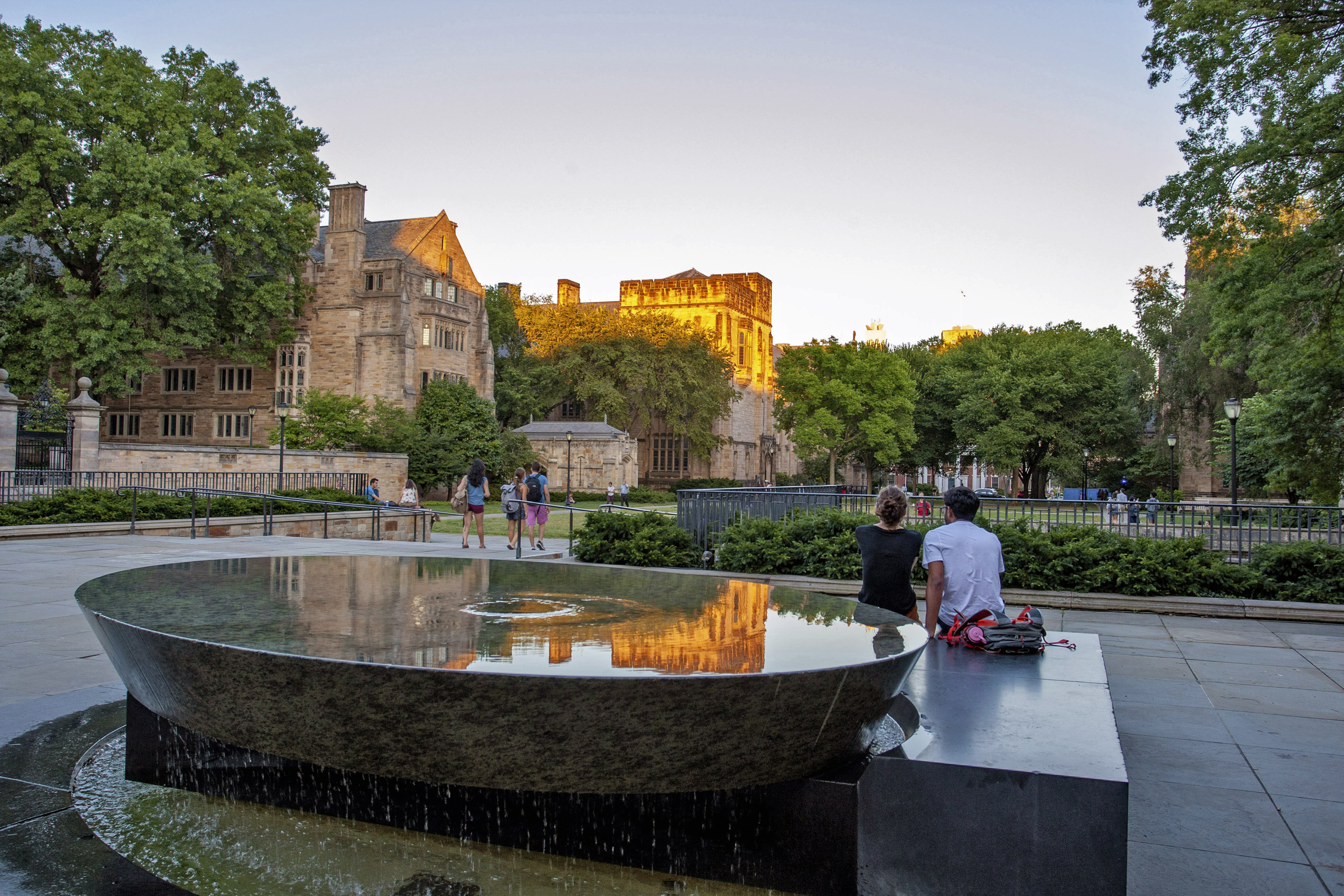
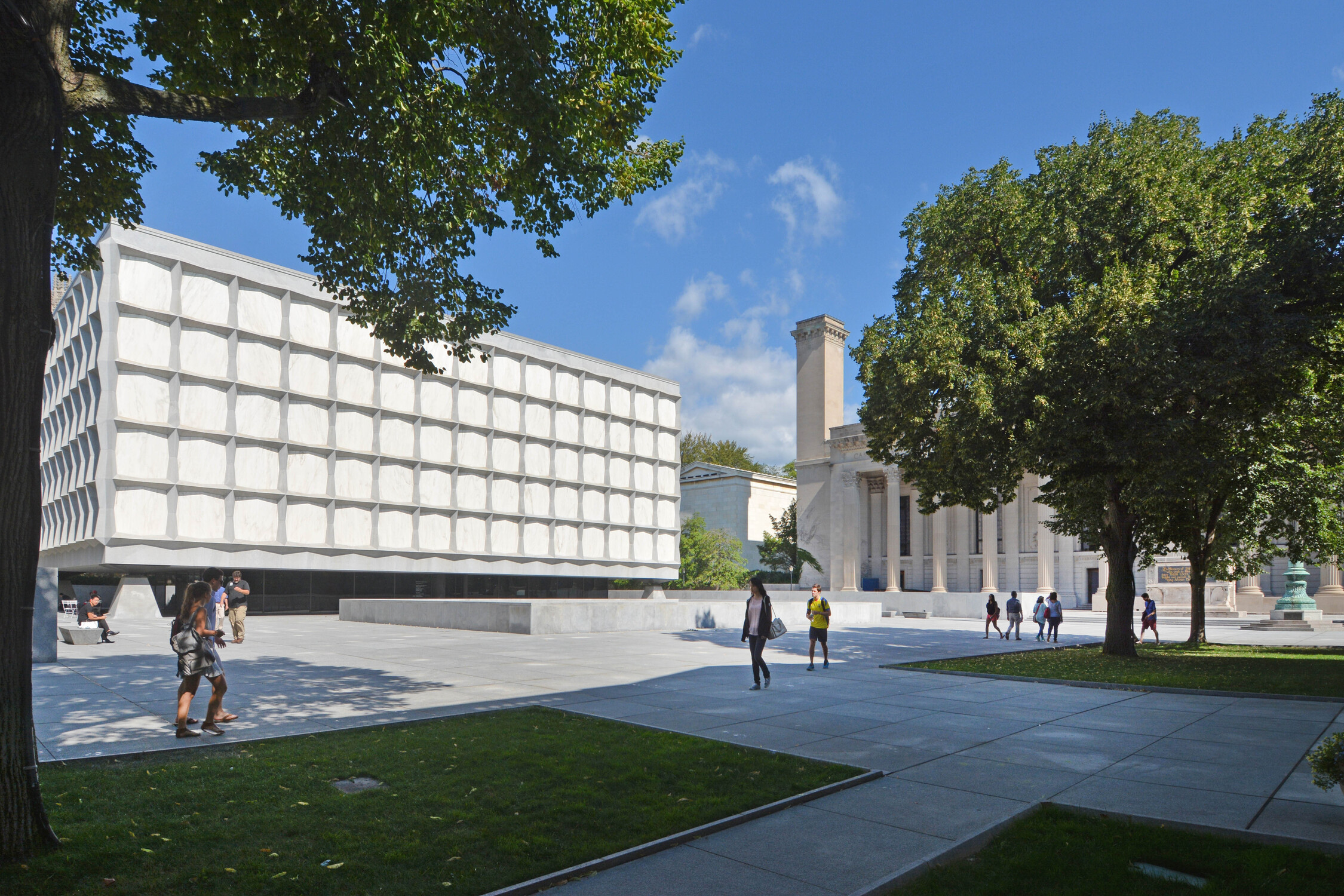
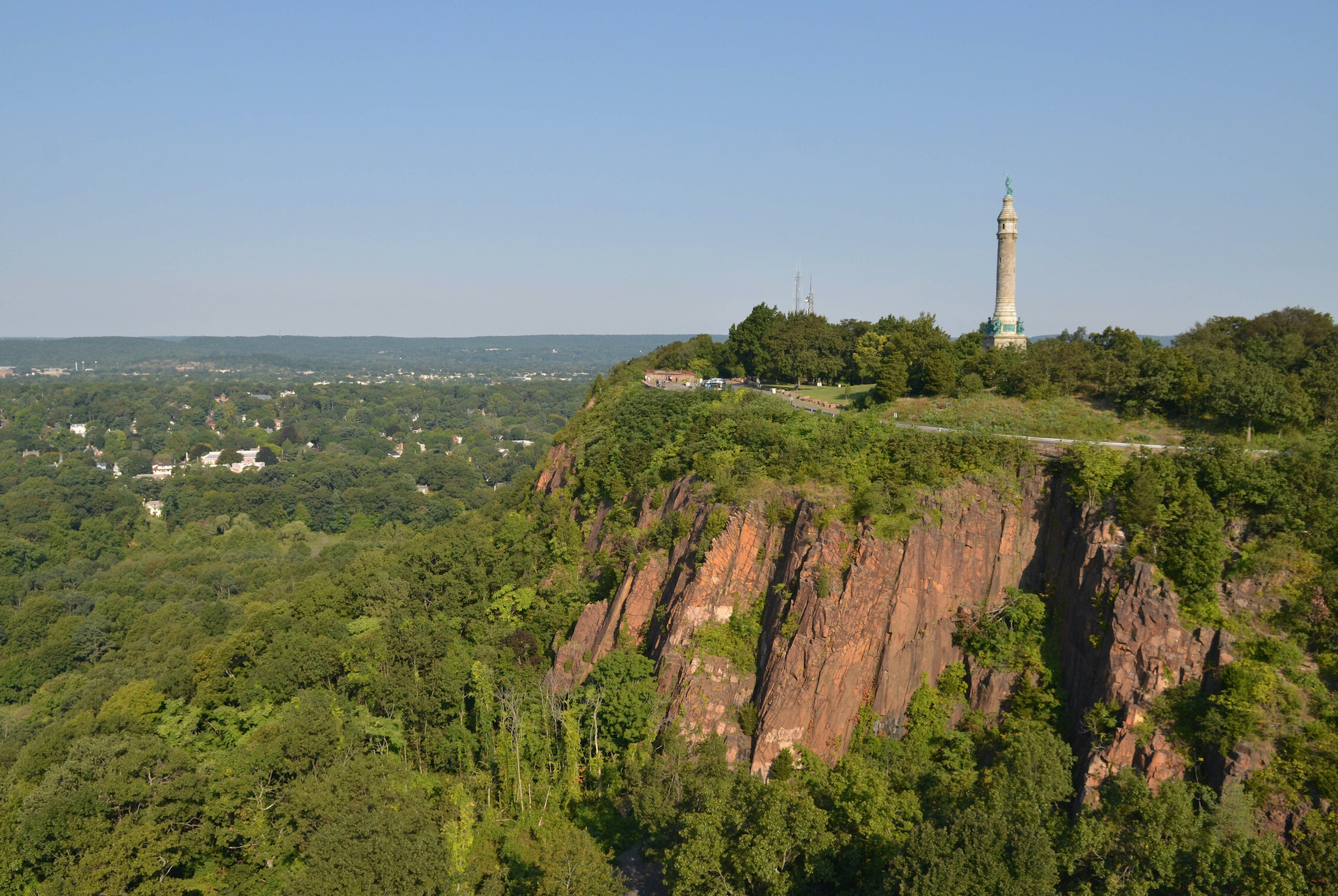
If coming from abroad, the easiest way to travel to Yale University is by air. There are a number of nearby airports serviced by international airlines.
Bradley International Airport (BDL) in Windsor Locks, Connecticut
John F. Kennedy International Airport (JFK) in New York City
LaGuardia International Airport (LGA) in New York City
Newark Liberty International Airport (EWR) in Newark, New Jersey
Tweed New Haven Airport (HVN) in New Haven, Connecticut
Amtrak provides services from Newark airport to New Haven’s Union Station. For all other airports, private shuttle services are available through Connecticut Limousine (800.472.5466) and GO Airport Shuttle (866.284.3247). Please be sure to make reservations for shuttle services well in advance. Taking a taxi from any of these airports except for Tweed is not recommended.
If traveling from within the United States, it is convenient to take a train to New Haven Union Station, minutes from Yale’s campus.
Metro-North Railways (800.638.7647) offers frequent train service between New Haven and New York City.
Amtrak (800.872.7245) provides train service to New Haven from Vermont, Providence, Boston, and Washington DC.
Once you reach the station, we suggest that you use a local taxi service to reach campus. There is a taxi stand at the station; a taxi ride costs approximately $10. Alternatively, local shuttles and bus services are also available for travel between Union Station and Yale.
If traveling from within the United States, it is also possible to take a bus to New Haven Union Station, which also serves as a bus terminal.
Greyhound (203.772.2470)
Peter Pan (800.343.9999)
There are multiple driving routes that you can take to arrive on campus. We recommend entering “OC Marsh Lecture Hall, 260 Whitney Ave, New Haven, CT 06511” into your GPS.
Parking in New Haven is often challenging, but the city is very walkable. It might be easier to park downtown at the hotel and walk to the conference site, on Science Hill. Alternatively, on-street parking is available (see map here for location and rate) or public parkins are available nearby (LAZ Parkings at The Audubon New Haven Garage or Grove Street Garage)
Please apply for travel visas well in advance of the conference. For visa letters or other information, please email florian.carle@yale.edu with subject heading "QEC 2025 Visa Inquiry”.

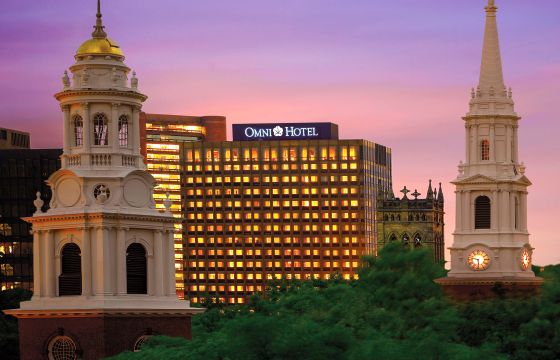

To allow QEC25 attendees a stress-free (and car-free!) conference, we offer a preferential rate of $189/night at the Omni Hotel, located in downtown New Haven, 1.5 blocks from the Yale University campus. This early bird rate is available for attendees until June 9. All rooms offer free cancellation before August 8.